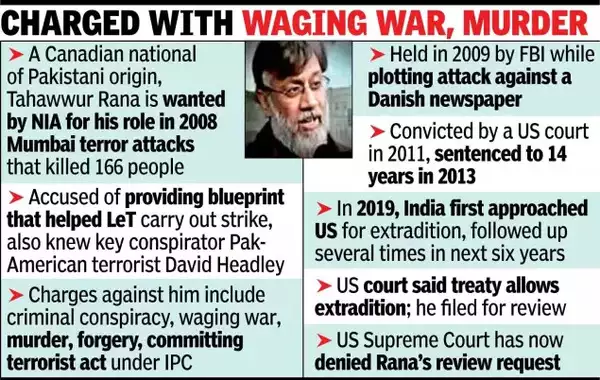NEW DELHI: US Supreme Court has refused to entertain Mumbai attacks accused Tahawwur Rana’s plea against extradition to India, clearing the way for Indian investigators to bring him to the country. The review petition was turned down on Jan 21, removing the last hurdle in the extradition of Pakistani native and Canadian national Rana, an aide of Pakistani-American David Coleman Headley, one of the main conspirators of the 26/11 attacks.
The writ was filed in Nov last year against an earlier order of a lower court that had ruled in favour of his extradition to India. “Petition DENIED,” Supreme Court said, according to reports from the US.

Rana had been sentenced to 14 years in prison in 2011 for conspiracy to provide material support to a terrorist plot to behead a Danish newspaper’s employees and providing material support to LeT, the UN proscribed terror group responsible for the Nov 2008 Mumbai attacks in which 166 people were killed. Headley, who had pleaded guilty in the Mumbai case, had testified as a govt witness in Rana’s trial.
Rana known to have worked with Headley, a key conspirator of Mumbai attacks
Headley testified that he travelled to Chicago and advised Rana, his long-time friend, to look for potential targets for terror attacks in India.
Rana lost legal battles in several federal courts, including the US Court of Appeals for the North Circuit in San Francisco.
Former US ambassador Eric Garcetti had told TOI in an interview last year that US authorities had built an airtight case for his extradition to India and that he expected him to be extradited soon, citing it as an example of strong counterterrorism cooperation between the two countries.
“In the Rana case, we have done everything the right way. Every court has so far upheld the work that India and the US are doing together on this extradition,” he had said.
Rana, who is currently in detention at the Metropolitan Detention Center in Los Angeles, is known to have worked with Headley, one of the main conspirators of the attacks. Headley obtained Rana’s consent to open an office of First World Immigration Services as a cover for his activities in India.
Earlier, US govt had argued in the court that the petition for a writ of certiorari should be denied. US solicitor general Elizabeth B Prelogar said this in its filing before the Supreme Court on Dec 16, according to an agency report from Washington. She said Rana was not entitled to relief from extradition to India in this case.
In his petitions for a writ of certiorari to review the judgment of the United States Court of Appeals for the Ninth Circuit, Rana argued that he was tried and acquitted in federal court in the Northern District of Illinois (Chicago) on charges relating to the 2008 terrorist attacks on Mumbai.
“India now seeks to extradite him for trial on charges based on the identical conduct at issue in the Chicago case,” it said. Prelogar disagreed.
“The govt does not concede that all of the conduct on which India seeks extradition was covered by the govt’s prosecution in this case. For example, India’s forgery charges are based in part on conduct that was not charged in the United States: petitioner’s use of false information in an application to formally open a branch office of the Immigration Law Center submitted to the Reserve Bank of India,” the US solicitor general had said.
“It is not clear that the jury’s verdict in this case which involves conspiracy charges and was somewhat difficult to parse means that he has been convicted or acquitted on all of the specific conduct that India has charged,” Prelogar had said.
A total of 166 people, including six Americans, were killed in the 2008 Mumbai terror attacks in which 10 Pakistani terrorists laid a more than 60-hour siege, attacking people at iconic and vital locations of Mumbai.
